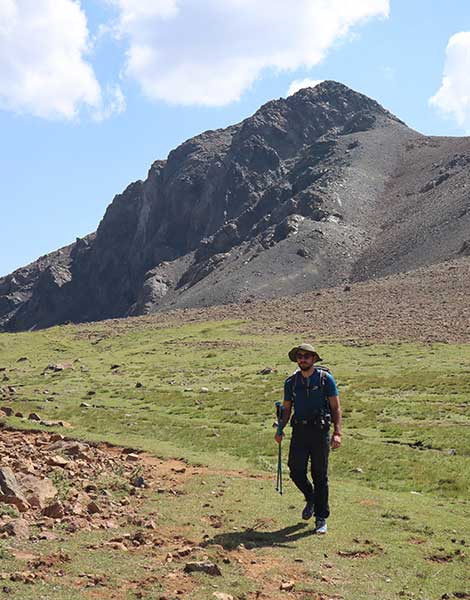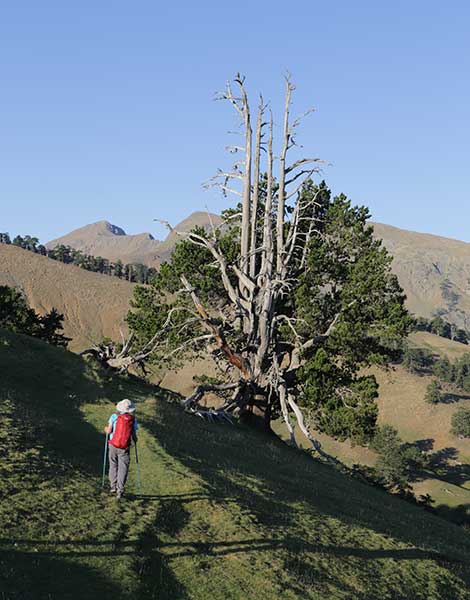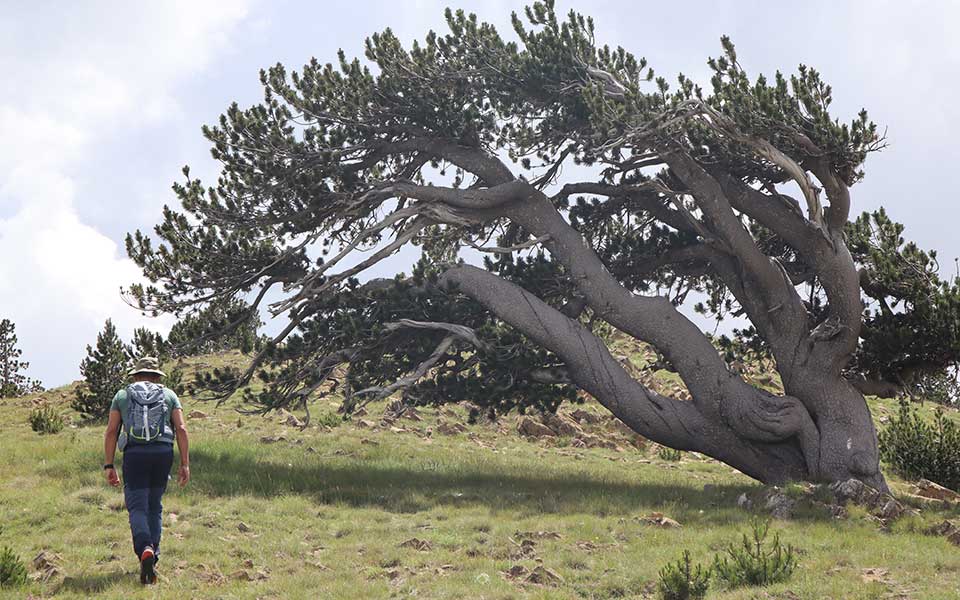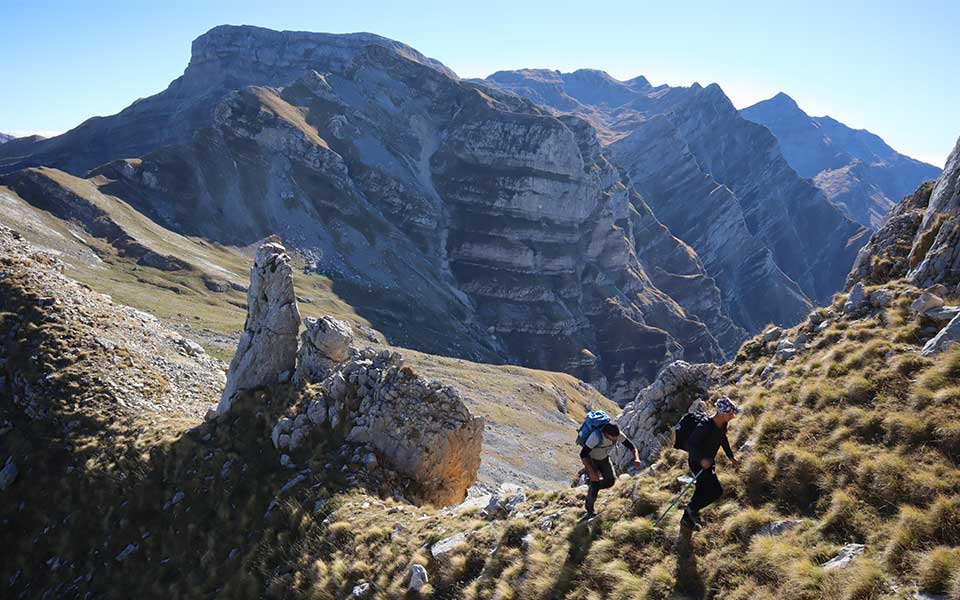I was hospitalized with Covid for two months last spring, spending one month in an induced coma. When I was released, my arms were myopathic and my entire body was weak due to the extended period of inactivity.
As a person who has been involved for decades with outdoor activities, as was natural, I took to the mountains. Without work waiting for me, time was plenty and I began going on climbs and treks. Many friends followed me, and I always had good company, and good spirits.
The multi-day excursions in particular were a revelation. We trekked from Metsovo to Smolikas, sleeping each night in a different village. In the afternoons we relaxed in village squares, eating, drinking coffee, chatting to the locals, planning the next leg. I was calm, enjoying the journey in a way I had almost forgotten, like a kid on a school trip. We went on other multi-day trips too, to Tymfi and Olympus, and everything seemed blissful.
I soon came to realize the reason for my sense of wellbeing. We traveled without any mental pressure, without any particular schedule, with no stress. I was enjoying nature as never before, and so were my friends. They may not have fallen ill like I had, but they had gone through lockdown – mentally it was almost the same.
Thinking back, I recalled my first 15-day trek in Agrafa, back in 1987 with a French party, a trip which bestowed me with a multitude of experiences – likewise for my clients. How far away that journey seems now, not just in time, but in spirit.


Walking in the mountains this year, I have spent a lot of time thinking about the world we live in today. A world of high speed and high performance in every area of life, increased productivity, competition, fast transport, fast internet, fast food, a world full of stress.
In the tourism industry, the dominant model recommends that tourists pack as many sights and destinations as possible into a few days. Large distances, few stops, overnight stays in five-star hotels without a trace of character, an endless pursuit of images to be captured on cellphones and social media.
However, in the midst of the Covid crisis, many have begun to ask themselves whether something might be wrong with the default way of life. During the lockdown in particular, more and more people, having lost loved ones or having had a close call themselves, having closed their businesses or lost their jobs, find themselves confronting a giant “why?”
After speaking with professionals in the outdoor leisure space before the second lockdown, I came to realize that unlike other economic sectors, our industry fared much better in the period between lockdowns than we had expected. Even though foreign tourism dropped by as much as 90% in many areas, the increase in domestic tourism kept us afloat. Some even saw an increase in business.
Even if someone didn’t have the money to spend on an organized activity, furlough resulted in plenty of free time. Many chose to make use of that time going for walks, hikes and bike rides along trails in nearby mountains and forests – a healthy, low-cost option which clears the mind and dispels feelings of isolation. In Ioannina, where I live, even during quarantine the lakeside promenade remains well-used. Lack of access to any other leisure and exercise venues including cafés, restaurants and gyms made many turn to other forms of release that they may have previously been unaware of. (Not everyone enjoyed their free time of course; some did not have any, some became disillusioned, some gave up, some are fighting just to stay alive.)
What is the reason behind this yearning to be outdoors? I don’t think one needs to dig too deep.
The ancients used to say, “healthy body, healthy mind”. Experts today continue to stress the benefits of physical exercise. When one combines exercise with an enjoyable activity – such as going for an energetic walk in nature or rowing along in a sea kayak, I believe the stress relief provided is such that no medical drug can compare.

Ever more people in recent years have become aware of how our modern lifestyle is leading us to a dead end with nothing but dangers for our planet. This new perspective at the environmental impact of every human activity, and recommends slow food, slow travel and the establishment of a new way of thinking and living, based on sustainability.
Some have begun to look critically at tourism, too. How can travel minimize its carbon footprint and contribute to sustainable development? Technology has provided some solutions: new planes and cars use less fuel than in the past. And although one can’t avoid flying to reach faraway destination, the rest of the trip can be adapted to minimize its impact. Once at a destination, one can prefer short local excursions, using public transport, trains and buses; one can plan for longer stays in one location taking part in sustainable outdoor activities; and one can opt to enjoy local gastronomy made using locally-sourced ingredients rather than food flown in from across the world, thus immersing oneself in the local culture and lifestyle.
This way of thinking has been captured in a new model of tourism, known as slow tourism, which is the opposite of everything fast. It is an alternative form of tourism which consists of slow-paced travel, but also sustainable practices which minimize environmental impacts and allow the visitor to gain a deep and authentic cultural experience.
Everything moves slowly on such a trip: travel, accommodation, food, luxuries, the scale of services. Visitors spend longer in specific locations to devote time to interacting with the locals, and to take part in a low-impact activities such as hiking, cycling, bread-baking, agritourism activities, a game of backgammon with the village champion.
Slow tourism does not just describe the slow pace of the journey. It offers in effect a sustainable mode of travel, more friendly to local cultures and the natural environment.
It is imperative that the day after a depressing and saddening experience such as that of the pandemic must have color, positivity, and active thought. Slow tourism, and particularly outdoor leisure activities offer an ideal form of tourism. Not just for the professionals in this space, but for everyone.
The natural environment is all that is needed for tomorrow.
* Christos Lambris is a mountain guide, and founder of Trekking Hellas. This article was first published in Greek in Kathimerini’s Sunday magazine K.












